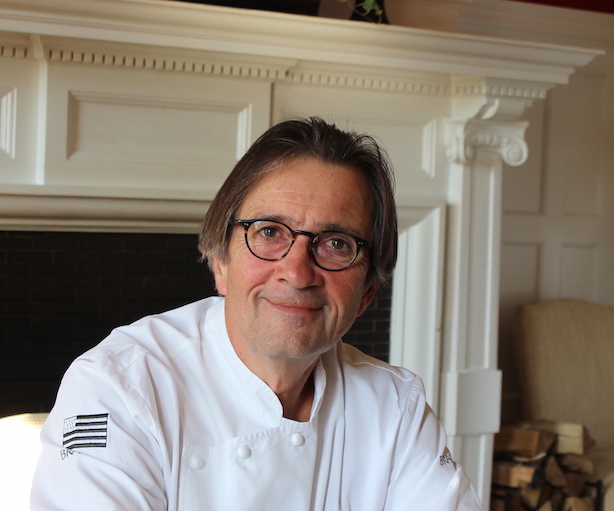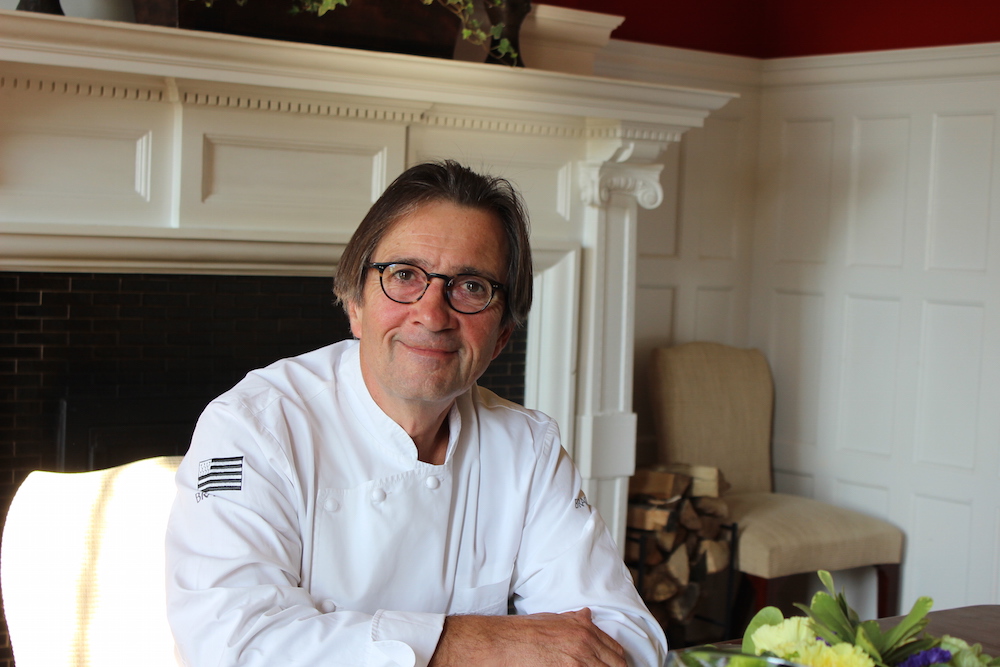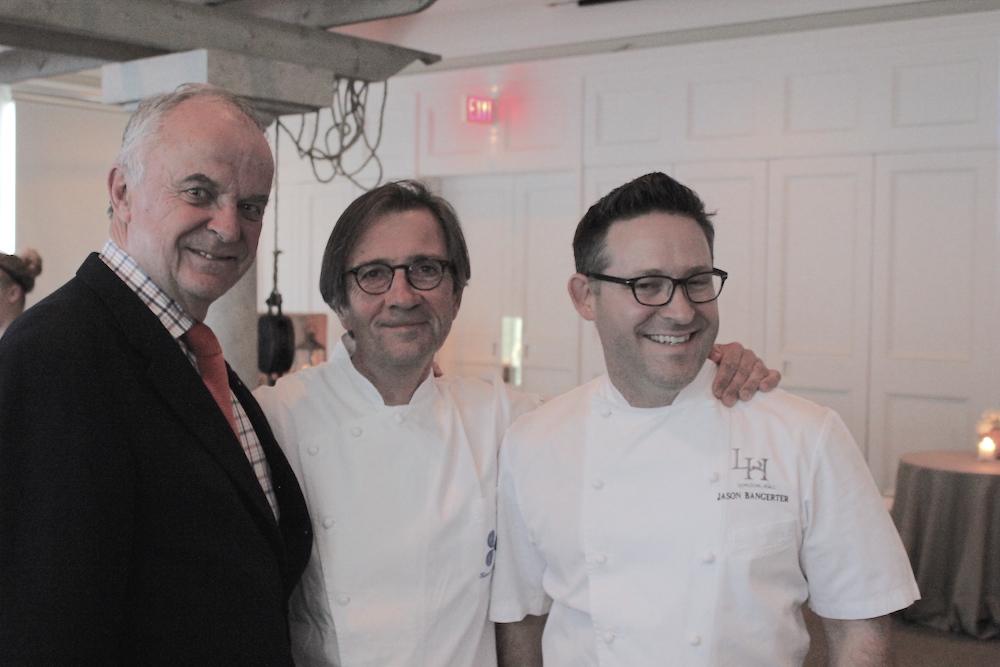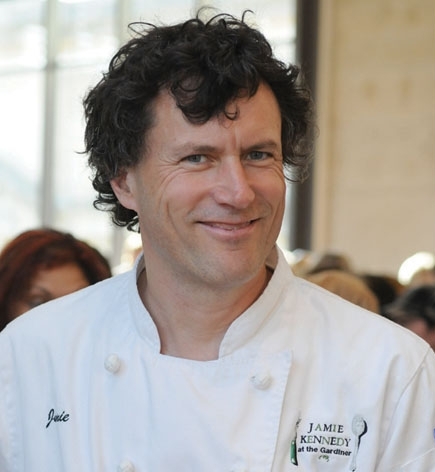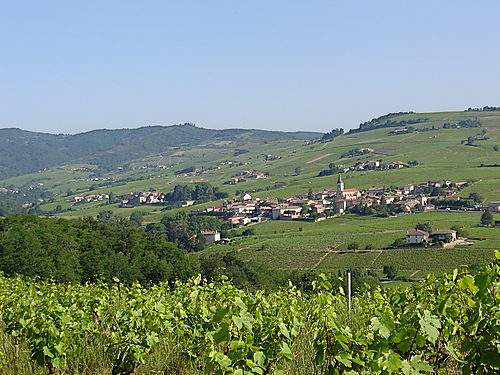Chef and proprietor (with his wife Jane) of Les Maisons de Bricourt, Olivier Roellinger’s story is as compelling as it is unique. The survivor of a near murderous beating as a young man, he decided to become a chef after his mother cooked through his convalescence. As he established himself, he broke French gastronomic convention in the 1980s by fusing the flavours of the seafood around his hometown of St. Malo with the exotic spices that once traded through that port. He overcame critical bafflement to earn three Michelin Stars, which he has since retired to oversee a simpler cuisine and focus on his spice importing and blending business, Épices Roellinger.
Les Maisons de Bricourt is a Relais & Chateaux property, and as part of the hotelier organization’s 60th anniversary celebrations, Roellinger was in this part of the world to cook along side Chef Jason Bangerter at Langdon Hall, where I met him last month. In the interview below, Chef Roellinger explains his connection to Langdon Hall and its owners Mary Beaton and Bill Bennett, his love for Brittany, history and why the spices of the world, and the people who grow them are his enduring passion.
INTERVIEW
I have translated this interview from French and edited it for clarity and style.
Good Food Revolution: Chef, you are yourself a hotelier, is it strange to be a guest in someone else’s hotel?
Olivier Roellinger: Yes. Although I am not a ‘classic’ guest because I am great friends of Mary and Bill, and besides I am working! But it’s marvelous to be here.
GFR: So how is it exactly that you are here at Langdon Hall?
OR: Well, first of all Relais & Chateaux is a big family. And I have been friends, with my wife Jane, with Mary and Bill for 20 years through Relais & Chateaux – despite a language barrier. Bill and Mary don’t speak French and my English is not very good, but we became very good friends anyway. So they asked me here and I said yes.
GFR: You have another Canadian connection because you are from St. Malo in Brittany…
OR: Yes, I have always been interested in Canada. I had a Canadian uncle named Boisvert, who married my mother’s sister during the war after he had landed in Normandy. But I am very interested in France’s maritime adventures, and the adventures of Jacques Cartier, who was born four kilometres from the house I was born in.
GFR: You’re famous as a chef for blending the spices that came form around the world to the port of St. Malo with the ingredients of Brittany. This part of your story fascinates me, because as an Anglo-Saxon, I am familiar with things like British East India Company, but hadn’t though much about the fact that there was a French East India Company as well.
OR: Cuisine is a medium for the expression of history. You cannot disengage history from a recipe or a creation. And when I think of the history of maritime adventure at St. Malo, in Brittany, in France, in Europe it’s always interesting to try and understand why people would travel by sea beyond the horizon… to find what? Of course, spices – but why? Because they were worth money? Yes, but why were they worth money? I am not the only one who wonders, but it’s a fascinating question. And I think it is a link between what happened before, what happens today and what will happen tomorrow.
GFR: That’s interesting because in the New World we have this problem of “authenticity”. How do we know if something is an authentic Canadian or American dish, for example? When we look at France, or say, Brittany, the answers to that sort of quiestion seem obvious. But I understand that when you started to blend your spices into these “authentic dishes” at Maisons de Bricourt the critics were not very happy.
OR: Oh, it was terrible. The critics didn’t have the cultural knowledge necessary to understand their history, and particularly the history of Brittany in France. Brittany was the last region to fight for its King and its God [during the French Revolution]. So, it was punished, and put to the side by the Republic. Before Brittany was probably the most advanced region because of its ports and access to the world and its universities. But after the revolution, everything that Brittany had contributed to France before the 19th Century was forgotten. So, as someone who wanted independence for Brittany (in my youth violently, now more gently), cooking was a means of expressing and participating in Breton cultural identity in a way that was both individual and collective. So, I didn’t want to show a closed Brittany of crêpes and peasant food. I wanted to reveal a Brittany that was open to the world through all of its mariners. So, I used spices that came from China, India, the Middle East and, of course, the New World. In particular vanilla, cocoa and chillies, because at the end of the 17th Century you could find all of these spices within the walls of St. Malo, this city of corsaires. The globalization of taste had already happened. And today we talk about fusion!
You know, when we talk about the history of humanity we focus on battles and conquests, but the history of food is a beautiful thing. You asked me about authenticity. Authenticity is, above all, about movement and change.
When an ingredient has a leaf or a root that doesn’t grow in our own garden, but grows somewhere else, maybe in another world, or even as some in the Middle Ages thought in the lost Garden of Eden, then it has great value because it is mysterious. Yet, the men and women [in Europe] who first came across these new plants and pieces instinctively knew how to use them to benefit their health. It’s fascinating. Without science or background, people understood how the new spices were antiseptic or antioxydizing – things that science has really only understood for 20 years. When people say spices were used to cover up bad tastes, like rotten meat, I shake my head.
GFR: They would have been too expensive. It would have been a waste of precious ingredients.
OR: Of course! Black pepper was worth its weight in gold and was used as a dowry. Spices were a way of showing you were rich; today you would have a Ferrari. Except the Ferrari won’t help you be in the best health. Spices were really in between food and medicine.
One of the other reasons why I am fascinated by spices, which is a little bit to the side of gastronomy, is that one of the differences between humans and animals is that we have the audacity to suppose that there exists something after death. In particular, through the ages humans have made tombs. Animals don’t make tombs because animals don’t know that they’re going to die. Humans know that they are going to die, so they make tombs to bury their dead. And then the first thing they want to do is somehow talk to their dead relatives, to bridge the world of the living with the world of the dead. And how do you do that? With incense. In any place of worship, anywhere in the world, there is always a role for incense. In a Catholic church, especially at a funeral, but also in a Hindu temple, a Buddhist temple, a shamanistic temple: always incense to speak with the spirits. So, spices really are more than just food.
And then, there is the way that spices connect humans. The first Europeans in the New World, including the Church, were racists. They wouldn’t eat what the savages ate. Even now, in the Caribbean when you get a snack with your rum punch it will be a cod fritter! This is a fish from the North Atlantic thousands of kilomtres away. It makes no sense. When I went to the fish market in Sao Paulo, what was the first thing I saw? Bacalhau! The first ones to really start eating the native foods were the pirates: outlaws. But eventually there were those that watched what the natives ate and followed. This meant recognizing that if a food was good for a native, and good for me, then we must both be humans. Putting spices on the table is a way to embrace the ‘other’, accepting the unknown.
GFR: And you know your producers for the Épices Roellinger, right? You have a relationship with them?
OR: I know every one of my spice growers. I visit every spice garden every two years. They are principally found in the north of Kerala in India, Madagascar, Cambodia and Mexico. I’d say about 95% of them are ‘Fair Trade’, but we don’t want to put the Fair Trade label on our products, although we pay Fair Trade prices. Why? Because we think it’s the products that aren’t Fair Trade that ought to have the label. The real market, real commerce is where everyone benefits. I want the best products and I want my producers to continue to give me the best products for years, so I must pay them enough for them to be sustainable. Also, about 90% of my producers are organic. So why don’t we add an organic label? Nearly all of them are in regions that are so poor that that the cost of certification would be impossible. It’s not worth it for them.
GFR: You enjoy your new role as a spice trader?
OR: My wife and I had to close our three star restaurant because of my health, and I wasn’t sure what to do. We had a lot of friends who did things like work for Doctors Without Borders, and they said things to me like, why don’t you do something for the spice growers that you’re always talking about. Then, I was buying spices by the kilo, now it’s by the ton. But also our customers would always ask what was in the sauces, so we would often send them home with a little bag of mixed spices… for free! It was crazy, but over thirty years [the business] was in place: I knew the producers to buy from. We knew everyone: we watched their children grow up. We’d see a producer send a child to school, or buy a new truck. And it’s given me a sense that these people, the forgotten people of the planet, were being recognized. After all, every chef wants to know where their food comes from, whether it’s pears, potatoes, chickens…
GFR: So do the customers. Now it’s written on menus!
OR: Yes, it’s crazy. But I am really pleased to help these spice growing communities be recognized. And the other thing that closing my three star and starting the spice business has done has allowed me to keep my team and cook more simply at the restaurant at les Maisons de Bricourt. This has been really interesting. I am cooking a cuisine that is much more simple, elegant and generous than three star, but also much more complicated to do than three star. That’s the first thing, as a chef. The second thing is that now I have the opportunity to share my knowledge with the customers of the restaurant but also with a much larger public. I can teach them that they can make their food sing and dance with the spices of the world. But still with the palate of a Breton, a Frenchman, a European. While I love exotic cuisine, my cuisine is not exotic. It’s a cuisine rooted in our identity and taste memory. And it’s not a hot cuisine. A cuisine of spices is not a cuisine of fire. It’s a cuisine of flavour. There are only three spicy tastes: chilli, pepper and ginger. But a cuisine of spice is a cuisine that is more flavourful and more joyous with less salt, less fat and less sugar. So, it brings more pleasure, is better for you, and builds community around the world. It may not seem like much to turn a pepper grinder. But if that pepper is from a supplier who respects his producers and product (and isn’t pepper that has circled the globe ten times for ten years before arriving on a supermarket shelf), then it will be good for your palate, your body and your spirit.
 Malcolm Jolley is a founding editor of Good Food Revolution and Executive Director of Good Food Media, the company that publishes it. Follow him on Twitter or Facebook.
Malcolm Jolley is a founding editor of Good Food Revolution and Executive Director of Good Food Media, the company that publishes it. Follow him on Twitter or Facebook.

